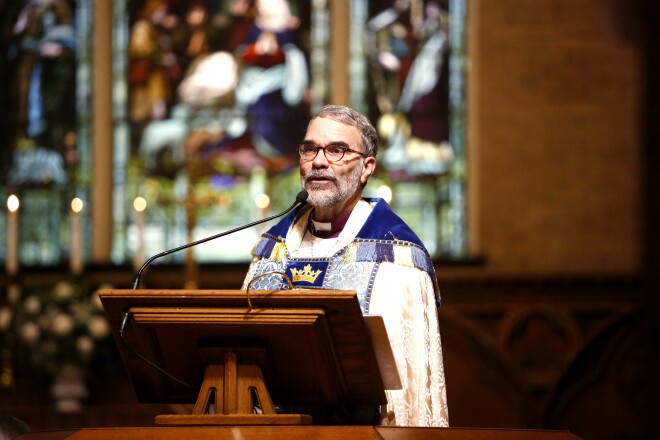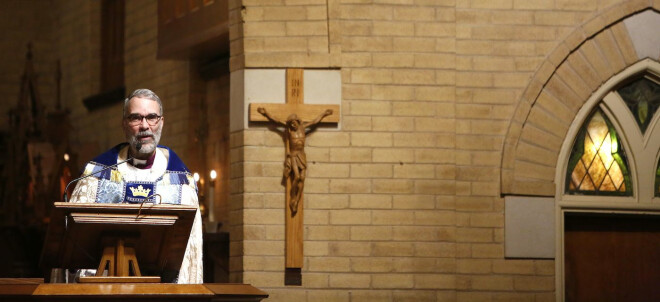Years ago, when I was the rector of a parish in upstate New York, we were neighbors to a considerable number of 'black bumper' Mennonites who farmed the surrounding fields. I once invited them to come visit our parish for an evening during a Lenten series. I worried that they just seem like oddities to our parish, but the visit came off better than that. While none of our young families was tempted to give up automobiles and buttons, they understood the reasons the Mennonites got to their seemingly extreme solution. The culture at large does not conduce naturally to faith. In fact postmodern culture is corrosive for young people in a variety of ways. How do you balance formation, the call to be a distinct people, and solidarity with our neighbors? In fact those Mennonites issued a challenge to my parishioners - turn off your television for all of Lent and read a book by “your CS Lewis” each week! If one were to summarize their vision of ministry, it might be this: society cannot be directly changed, but they should offer a witness by their living to peace, humility, and community. In such groups visions of the future are sometimes incubated (so the Anglican sociologist David Martin).
A second background example may also be helpful. The great theologian and sociologist of religion H. Richard Niebuhr wrote a book that proved influential for two generations of Church life called “Christ and Culture,” which laid out a typology of relationships between Churches and their surroundings: of culture, against culture, above culture, and (most appealingly especially to Episcopalians) transforming culture. Our tradition of establishment in England has loaded the dice toward the last (which may really be the first ) option, though the experience of the younger churches in the Majority World has been different. But the New Testament does not privilege this alternative, and surely there are aspects of contemporary culture, which, like those young parents in my parish, give us pause.
Rod Dreher is a conservative Christian commentator (who writes sometimes for the Dallas Morning News), and his recent book “The Benedict Option” has made a stir. Not everyone reading this blog will agree with his political judgments, but the book is important nonetheless. At the very least it provides background for some of our thinking in the Diocese of Dallas. First of all it gives a readable primer of the philosophical influences in the West, which led to a culture so indifferent and at times hostile to traditional Christianity. The assumptions are of a distant and deistic God, of a consumerist model of human interaction, and of a psychologized and “emotivist” sense of self according to which we must invent meaning in a universe with no inherent ends. In such a world Christianity is leisure, resource, and personal feeling. Secondly it sums of the arguments of key post liberal thinkers opposing such a view, especially Charles Taylor and Alisdair MacIntyre, the latter of whom called for a new and different Benedict to lead us in a world organized after virtue.
What does he (and so Dreher) mean? You will recall that Benedict left society in the time of the decline of Roman civilization and the early dark ages and helped provide a rule for communities set apart and living the Christian life apart and quietly. It was the Benedictines who preserved learning for another era. They were instrumental in the evangelization of the British Isles. He is offering an analogy between our era and that one (and like most such arguments, behind this, an analogy to the exilic period of Biblical history).
According to Dreher, what would this neo-Benedictine witness look like? First of all, Christian sub-cultures need catechesis, to cultivate an alternative (and more ancient) vision of the true nature of the world. Entailed in this is retrieving wisdom from an earlier time. Moral practices like eschewing euthanasia would set the community apart. He mentions fostering Christian schools. But he also thinks that cultural norms like acquisitiveness and social isolation need to be challenged. The critique has to be wider and have more bite than hot - button issues. But it all is local, modest, close-to-the-ground.
Are we Episcopalians cut out for this historically? Hardly. Nor is it clear what relation this would have with our Church as a struggling institution. But the history of modern Anglicanism has been at times one of surprising creativity in the face of crisis:
Anglo - Catholicism, the global missionary movement, the East African revival, the charismatic renewal, Alpha. Who knows - perhaps God the Holy Spirit has another surprising chapter in Anglican Church history.
Peace
+GRS





